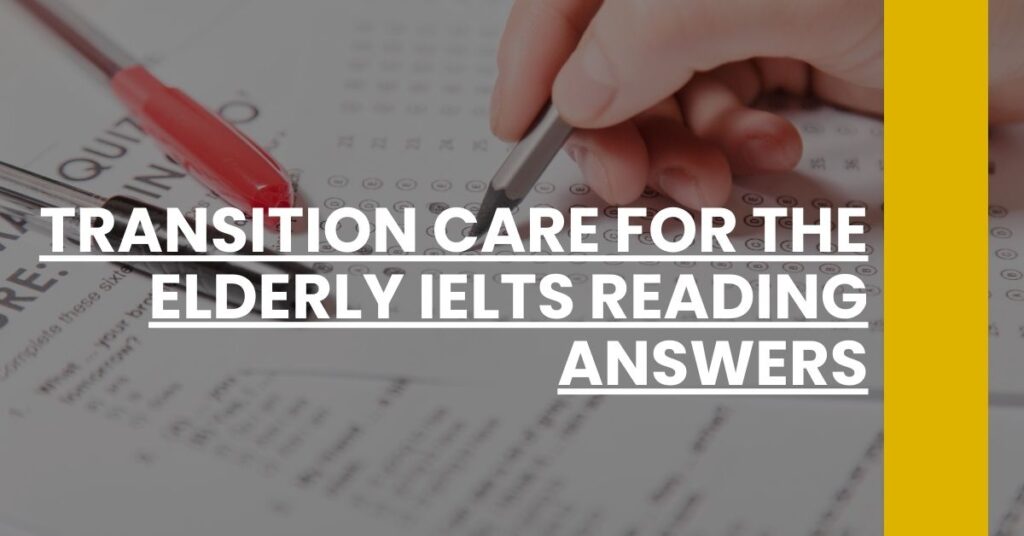Transition care for the elderly ensures seniors receive the necessary support during crucial healthcare transitions, such as moving between home care, hospitals, or residential care facilities. It aims to smooth these periods of change, minimize risks, and enhance recovery.
In an IELTS reading passage about transition care, you’ll likely encounter:
- Strategies for effective transitional support
- Challenges and solutions in care transition
- Components of a multidisciplinary approach
Understanding transition care is vital for both personal knowledge and academic success in IELTS reading comprehension.
- Understanding Transition Care for the Elderly
- The Importance of Transition Care in an Aging Society
- Key Components of Transition Care
- Addressing Common Challenges in Elderly Transition Care
- IELTS Reading Material: A Tool for Learning and Assessment
- Dissecting the ‘Transition Care for the Elderly’ IELTS Reading Passage
- Strategies to Find Answers in IELTS Reading Passages
- Practice Questions and Tips for IELTS Reading Success
- Resources for Further Study on Transition Care and IELTS Preparation
- Conclusion
Understanding Transition Care for the Elderly
As you grapple with the myriad challenges of aging and caregiving, it’s essential to familiarize yourself with transition care for the elderly. Transition care refers to the short-term assistance provided to older adults after a hospital stay, aiming to improve their recovery and reduce the likelihood of readmission. It’s a bridge between hospital care and resuming life at home or in a long-term care setting.
Transition care encompasses more than just medical needs. It integrates:
- Medical management: Ensuring medication schedules and health care appointments are maintained.
- Personal care assistance: Aid with activities of daily living such as bathing, dressing, and eating.
- Rehabilitation services: Such as physical, occupational, and speech therapy to help regain strength and independence.
- Care coordination: A care manager or coordinator works with elderly patients to navigate the healthcare system and find resources and services.
- Family and caregiver support: Educating and supporting caregivers on how to best assist with the transition.
This comprehensive care approach helps manage risks and ensures a continuum of care which is pivotal for the optimal well-being of the elderly during vulnerable periods. As you contemplate this profound aspect of elderly care, recent strategies highlight its importance in today’s healthcare environment.
The Importance of Transition Care in an Aging Society
When pondering the significance of transition care, you must consider the broader landscape of our evolving demographic makeup. We’re living in an era where the proportion of elderly individuals is rising, inevitably intensifying the demands on healthcare systems across the globe.
This demographic trend heralds several implications:
- An increase in the number of people with chronic conditions who need ongoing healthcare management.
- A growing need for appropriately designed healthcare services that cater to the unique needs of older adults.
- An escalated burden on caregivers who often juggle their responsibilities with other commitments.
Your awareness of these facts situates you and your loved ones in a better position to navigate the transitional phases elderly individuals commonly encounter.
Key Components of Transition Care
As you explore the depths of transition care, a series of essential components contribute to its efficacy. These include:
- Screening for High-Risk Patients: Identifying individuals who are most likely to benefit from transition care services.
- Developing a Comprehensive Care Plan: Aligning the care plan with the individual’s goals, preferences, and medical needs.
- Engaging with Patients and Caregivers: Involving both parties in decision-making processes to ensure that care plans match the patient’s living environment and caregiver capabilities.
- Effective Communication: Facilitating smooth information exchange between healthcare providers, patients, and caregivers.
- Ensuring Continuity of Care: Managing transfers between care settings with minimal disruption.
Having a grasp of these components empowers you to ask the right questions and demand high-quality care when discussing transition plans with healthcare professionals. If you’re eager to dive deeper into the strategies that shape effective transitional care, this detailed analysis offers a valuable resource.
Addressing Common Challenges in Elderly Transition Care
Envisioning a seamless transition for the elderly can be daunting, especially when considering the common barriers that one might encounter. From inadequate coordination between healthcare providers to the overwhelming complexity of managing medications and appointments, the list of challenges is non-exhaustive.
Here are a few common hurdles:
- Communication Gaps: Critical information sometimes falls through the cracks during transitions between care providers.
- Caregiver Strain: Family members or friends providing care may lack the necessary support and resources.
- Complex Care Needs: The elderly often have multiple health issues that create complicated treatment regimens.
Arming yourself with knowledge about these obstacles, you can better advocate for comprehensive transition care plans that address these issues head-on. For a closer look at how transitional care aims to tackle these challenges, consider the insights from this research publication.
IELTS Reading Material: A Tool for Learning and Assessment
Transitioning to the topic of language proficiency, you might wonder how IELTS reading materials align with understanding elderly care. Reading sections in IELTS exams often encompass a variety of complex topics, including healthcare-related ones. These passages aren’t just designed to test your comprehension skills; they’re also educational.
By engaging with IELTS reading passages about healthcare, you can:
- Enhance your vocabulary on specific topics like transition care for the elderly.
- Develop the ability to analyze and understand nuanced information.
- Practice summarizing and paraphrasing complex ideas.
So, when you delve into IELTS reading answers that involve elderly care, you’re not only honing your English skills but also gaining a deeper understanding of critical healthcare concepts that are increasingly relevant in our society. For those interested in using IELTS materials for learning beyond language, authentic reading resources can be invaluable.
Dissecting the ‘Transition Care for the Elderly’ IELTS Reading Passage
When engaging with a passage pertaining to transition care for the elderly within an IELTS context, it’s essential to dissect the text methodically. A good approach involves:
- Skimming the passage for a general understanding. Pay attention to headings, subheadings, and any highlighted or bold terms—they provide clues to the main ideas.
- Scanning for specific details that align with the questions asked. You’re not reading for enjoyment; you’re on a quest to locate particular pieces of information.
- Identifying transition signals such as ‘however’, ‘for instance’, or ‘consequently’. These words often introduce critical points, contrasts, or conclusions.
- Recognizing paraphrased ideas. IELTS questions rarely use the exact wording from the text; learn to match synonyms and similar phrases.
As you dissect, you may realize that an IELTS reading passage is like a puzzle. Every paragraph, sentence, and word is placed with intent. To better understand how to tackle such passages, including those about transition care for the elderly, delve into some strategies for reading comprehension.
Strategies to Find Answers in IELTS Reading Passages
In the quest for transition care for the elderly IELTS reading answers, certain strategies can lead to triumph. Here’s how you can enhance your answer-finding skills:
- Underline Keywords: In both the questions and the passage, underline keywords. These are often nouns or verbs that encapsulate the core idea.
- Look for Synonyms: IELTS loves to rephrase ideas. Keep an eye out for synonyms and antonyms that may point you to the answers.
- Practice Logical Reasoning: Some questions may not be directly answered in the text. Use information provided to make inferences.
Remember, these readings are less about the complexity of the topic—for example, the nuances of elderly care—and more about comprehending and deriving answers from the text, in a timed setting no less. To refine your ability to swiftly pinpoint answers, consider further reading tips that pertain to the IELTS format.
Practice Questions and Tips for IELTS Reading Success
IELTS success is in part about practice. Here, imagine you’re encountering practice questions about transition care for the elderly:
- “What are three common elements of transition care for the elderly?” Look for: Lists or series of components.
- “According to the passage, what is a significant challenge in providing transition care?” Search for: Keywords like ‘challenges’, ‘difficulties’, or mention of problems in the care system.
For each type of question:
- True/False/Not Given: Consider whether the statement corresponds to the passage’s information, isn’t addressed, or if it’s the opposite.
- Multiple Choice: Carefully evaluate all options. There’s usually one that’s almost correct but not quite; don’t let it trip you up.
Consistent practice with these types of questions, and reflection on answers—right or wrong—can build your IELTS reading acumen. Dive into more practice and tips to refine your ability by exploring reading practice materials and getting to grips with common IELTS question formats.
Resources for Further Study on Transition Care and IELTS Preparation
Expanding your knowledge on transition care for the elderly, as well as improving your IELTS reading skills, requires quality resources. While this article has provided a solid foundation, you may want to delve deeper.
For transition care, following journal articles like those from the National Center for Biotechnology Information can offer comprehensive insight into the field’s latest research and applications. For IELTS preparation, official practice materials, as well as reputable online platforms, are invaluable.
Commit to these resources; they’re just a few clicks away but can make a significant difference in your comprehension and test-taking confidence.
Conclusion
You came here seeking clarity on transition care for the elderly IELTS reading answers, and hopefully, you’ve found not only answers but also a wellspring of knowledge and strategies. Whether immersing yourself in the complexities of transition care or honing your IELTS reading skills, the insights and resources available can empower you to approach both topics with confidence.
Remember, as our society progresses towards an aging demographic, understanding transition care becomes more than a task—it’s an investment in compassion and social responsibility. Your journey through transition care and IELTS mastery can be challenging yet enriching, leaving you better prepared for both the exams before you and the real-world scenarios they reflect.
Transition care for the elderly IELTS reading answers explored—boost comprehension with curated strategies and practice questions.

